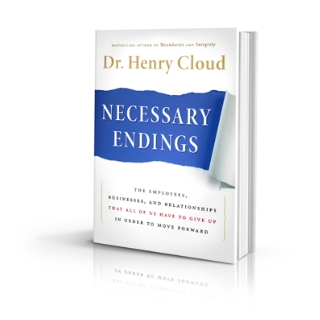I first was introduced to Dr. Henry Cloud when I read his book Boundaries. That book is a must read as far as I’m concerned for anyone doing anything. So when Dr. Cloud brought out his new book “Necessary Endings”
I had to get it. This book presents the case that we should all end more things that are not necessarily benefiting us in a healthy way. So this could be quitting your job, closing your company, letting go an employee, breaking up with a significant other, etc. It provides practical guidelines to determine how to know when it’s time to end something, and when it’s something worth holding on to.
To me this is just another way of talking about the time efficiency absolutes. You need to be willing to end things in order to begin new things. If you’re spending your time on an unprofitable part of your business than you are taking that time away from the most profitable parts, thereby hurting your business. If you have trouble letting things go, then this book will help you work through that issue and learn to end things more confidently and comfortably.
Dr. Cloud uses the metaphor of “pruning a rosebush”. A rosebush in the wild will grow too many limbs and none will ultimately be that spectacular because the plant can’t deliver enough nutrients to each limb. By pruning the weaker limbs you are allowing the bush to reallocate it’s resources to the better ones and deliver more nutrients to the best limbs, thereby enabling it to grow much stronger than it would have otherwise. The same applies to your life. You need to stop wasting your resources on the “weaker limbs” in your life. Is it an addiction to a trashy TV show? A friend that you shouldn’t waste your time with anymore?
The part of the book that stood out to me the most was actually the conclusion. In it, life is described as a series of events that are constantly ending, while new ones are beginning. The key is to try your hardest at each of those events. They will eventually lead to greater and greater things, but you must know when to move from one to another, and to keep up the pace. I thought this was a good approach to consider when you’re overwhelmed. It helps you break down life to “baby steps”, which makes it much more manageable.
So the question then is, what are you spending your time on that you shouldn’t be? Who is working for you that shouldn’t be? What are you holding onto what is not good for you? It’s good to constantly be asking yourself these questions in order to prune your life, and reading this book is a great way to review these things.




